ILIGAN CITY (MindaNews / 26 Dec) – It’s been two years since our clan had a Christmas tapoktapok. While most people talk about COVID-19 pandemic in the past tense, we continued to observe safety precautions. We chose an open air venue with several tables scattered beside a lap pool, a tropical interior motif, and within 10 minutes of our homes. We could keep our masks on during socialization, go to our separate tables and take our masks off for our meals, then put the masks back on to continue our chitchat and videoke.
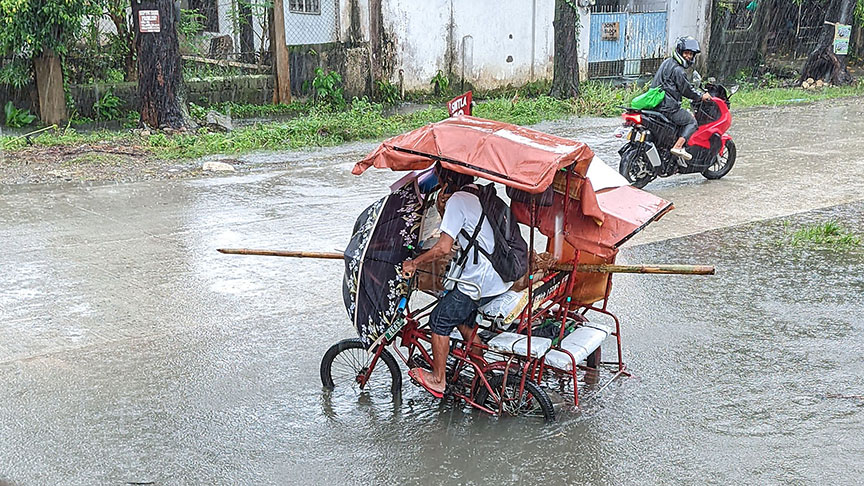 A lechon delivery guy driving a trisikad struggles in the flood while talking to his customer on a mobile phone. MindaNews photo by BOBBY TIMONERA
A lechon delivery guy driving a trisikad struggles in the flood while talking to his customer on a mobile phone. MindaNews photo by BOBBY TIMONERA
While Miriam went for her usual morning hospital rounds, me and Arkay left our place exactly 11:12 a.m. It was raining and I noticed the road already slightly flooded. I took a photo, and sent it to my wife to alert her.
Then we drove to the private venue, along Miguel Sheker Ave. somewhere between Children’s Park and the Adventist church. There was a slight drizzle but the street wasn’t flooded. I monitored the flood situation in our residence by checking the CCTV from my phone. During a heavy rain, our street transforms into a murky river, the water level usually rises fast, but also subsides quickly when the rain stops.
I parked my car across the street from the venue, then joined the clan inside. The rain was getting heavier by the time Miriam came back from her hospital rounds. A little past 12 noon, I went out to get food from the car. Outside the venue, I overheard two people talking about how the street was flooded the night before, with water up to eight inches high, and even higher in the area where our cars were parked.
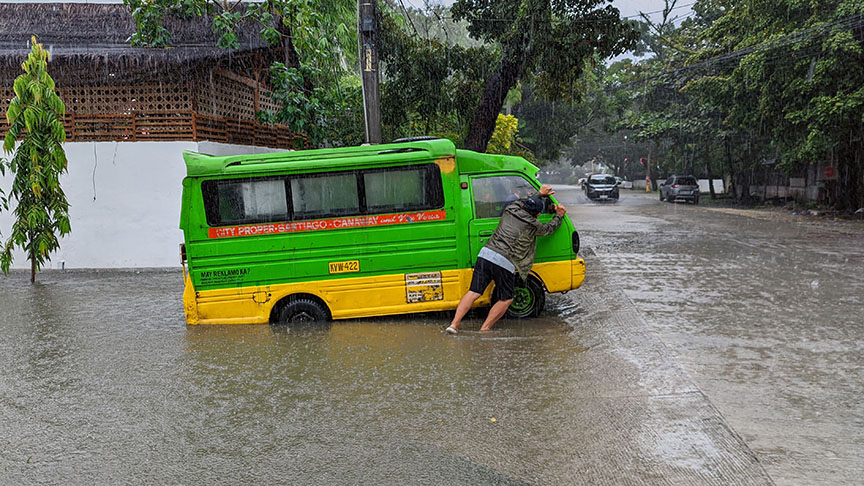 Rescuing a jeepney that conked out in the flood. MindaNews photo by BOBBY TIMONERA
Rescuing a jeepney that conked out in the flood. MindaNews photo by BOBBY TIMONERA
Uh-oh … I forgot that our venue is in one of the most flood-prone areas in Iligan. Even worse than our place. I can see the water in the wide canal already at the level of the street. I informed the rest of the clan so they can move their cars to higher ground. I drove mine to maybe 40 meters away. Walked back to get my wife’s car and parked it next to mine. When I walked back to the venue, I saw a green jeepney partially submerged in flood water along Miguelito Sheker Lane, perpendicular to the main road. It was being pushed by my brother-in-law Senan and a few other men towards the main street but they needed more hands. The driver called out to me so I rushed and helped push, first with just one hand as I held the umbrella with my left, but had to drop the umbrella and push with my two hands. We waded in knee deep flood waters but were able to push the jeepney to safety.
Then Senan and I got back inside the venue and promptly washed our legs with soap and water.
We joined the clan, got busy chatting while the others sang with the videoke and the kids played in the pool despite the rain.
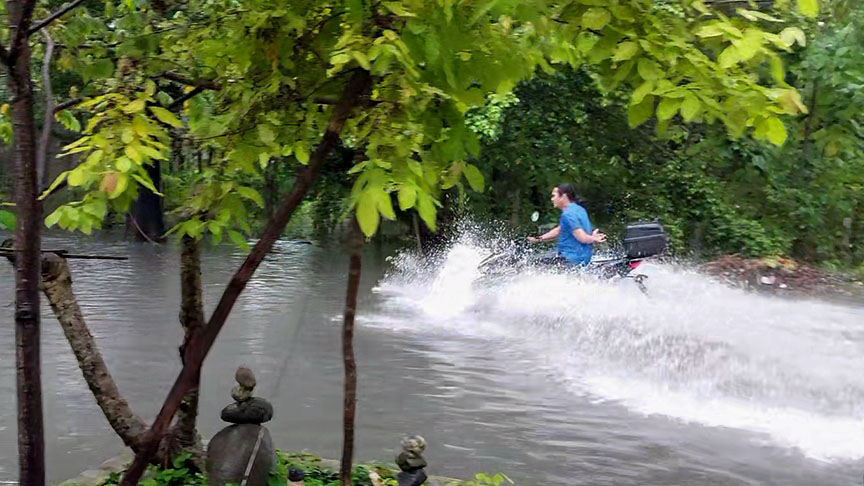 A motorbike? Or a Jet Ski? MindaNews photo by BOBBY TIMONERA
A motorbike? Or a Jet Ski? MindaNews photo by BOBBY TIMONERA
Thirty minute later, as I looked out to the streets, whoa! The flood water had risen. It’s now maybe six inches on the main street (Miguel), but much higher, maybe waist deep, on the perpendicular road (Miguelito). The scene was mesmerizing as people and vehicles traversed the flooded streets.
I saw a trisikad pedaling away with two passengers. A white dump truck just sped through.
Then a trisikad again. But this time, it was carrying a lechon, wrapped in Manila paper, the poor roasted pig still on the bamboo pole used to roast it. The long pole was protruding at the front and back of the trisikad. With the front end sharpened, the bamboo could be a hazard for someone who’d cross paths with the trisikad. The driver was on the phone, maybe getting directions where to deliver his precious cargo. A passing rider with a helmet on a motorbike can’t help but smile, impressed with the lechon delivery guy. Then the trisikad driver disembarked as he approached the inclined road at the intersection, and pushed his rickety vehicle by his lonesome up the main street.
“Is that our lechon?” I asked family members. “It’s supposed to be delivered at 1:00 o’clock, and it’s still a quarter to one. So maybe that’s not it,” Rizza answered.
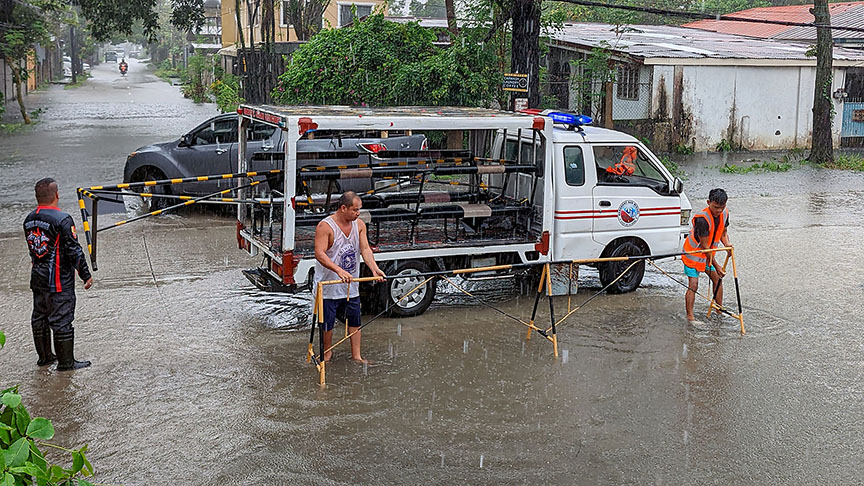 Barangay San Miguel workers put up metal barriers to prevent motorists from driving through deep flood waters. MindaNews photo by BOBBY TIMONERA
Barangay San Miguel workers put up metal barriers to prevent motorists from driving through deep flood waters. MindaNews photo by BOBBY TIMONERA
The lechon delivery guy crossed the intersection, moved on, and disappeared from my line of sight.
More vehicles crossed the flooded streets – a blue Revo, a covered motorbike with three passengers, a Honda City, a black double-cab pickup truck, a red Pinoy jeepney.
The next vehicle that came was a white van with an open back owned by the barangay. Volunteers brought down metal road barriers painted with yellow and black, and blocked the flooded Miguelito street on both sides of the intersection to prevent vehicles from driving into the deep flood waters.
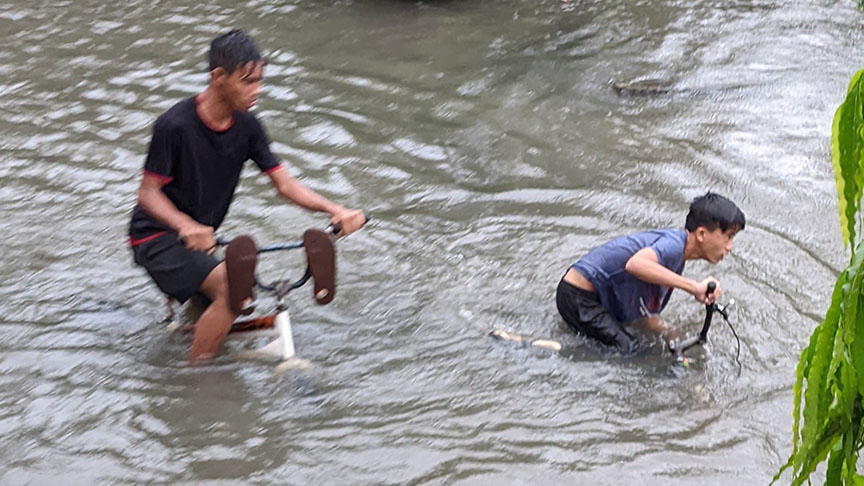 Boys having fun in the flood. MindaNews photo by BOBBY TIMONERA
Boys having fun in the flood. MindaNews photo by BOBBY TIMONERA
As all these happened, I enjoyed taking pictures and video clips of vehicles and people passing by on both streets. Sometimes I had to take my shot through narrow holes in the wall inside the venue, or go outside and stand on a concrete planter’s box with an umbrella on my left hand, phone on my right. Some vehicles made it, a few conked out. One motorcycle was speeding through Miguel St. with a water splash behind it like a Jet Ski. The driver was fearless and must really know the place, because some 4×4 pickup trucks had to slow down, making sure they won’t fall into the canals.
Every now and then I’d check the CCTV at home. Our street is also flooded. Our kasambahay texted to say that water had already entered the garage, maybe two inches high. Nothing to worry, because only recently, we already installed a permanent concrete barrier around the garage so the water can’t get inside the house.
For safety, I told her to turn off switch number 11 in the electric switchboard, which supplies power to the wall outlet in the garage.
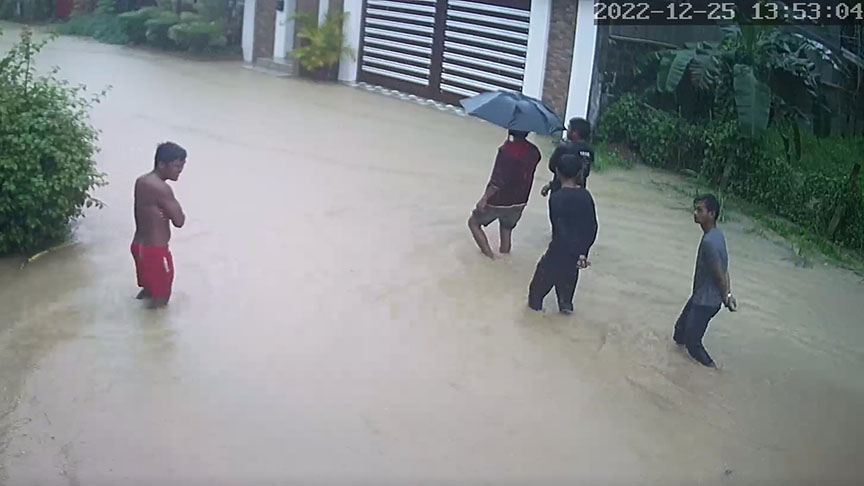 Meanwhile, outside our house, a view from our CCTV.
Meanwhile, outside our house, a view from our CCTV.
Before we had the permanent concrete barriers, we had built flood gates that we’d install every time our street got flooded. Because before that, flood waters had entered the house a few times, which usually took us a week to clean up.
By 4 o’clock, after the rain had stopped, I noticed the water in front of our house had already subsided. We could go home but the water outside the venue continued to rise.
Along Miguel St., the current was strong but the water was clear, like a river. We could either wait for the flood to subside or wade through flood waters to get to our cars.
But Miriam had another plan. She proposed we get a trisikad to bring us to our cars. I looked at her – in her yoga suit, skirt and high heels – and was incredulous.
There she was, standing on the planter’s box, hailed the first trisikad that passed by, and boarded it as nimble as a cat. I forgot she took up stunts and tumbling, and gymnastics in her physical education classes at U.
P. High, then dance for the four P.E. classes in college.
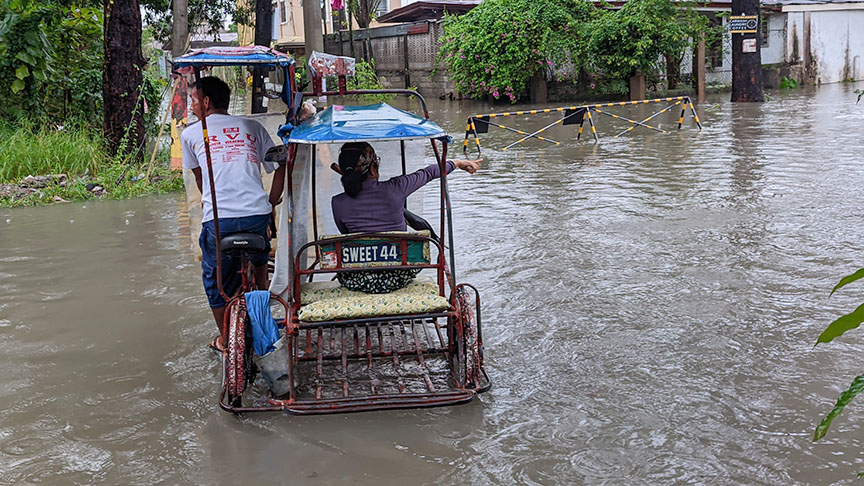 Miriam in the trisikad. MindaNews photo by BOBBY TIMONERA
Miriam in the trisikad. MindaNews photo by BOBBY TIMONERA
When she got to her car, she asked the trisikad driver to go back and fetch me and Arkay. Okay, if she can do it, we boys should be able to do it!
Later in the evening, as I checked on our clan FB group, my siblings and nephews and nieces were already talking about how many doses of Doxycycline they will take the next day. They all got wet in the flood.
I took mine just to be sure. (Bobby Timonera / MindaNews)
